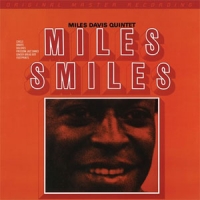Description:
The clarity afforded by history proves Miles Davis' second great quintet vying for the unofficial honor of being the finest small jazz combo to ever record to tape. Originally released in 1966, Miles Smiles is largely responsible for the feat, as it commences a series of five groundbreaking albums chronologically rounded out by Sorcerer, Nefertiti, Miles in the Sky, and Filles de Kilimanjaro – guided not by chordal patterns but open responses to melodies. Music would never again be the same. Neither will experiencing Miles Smiles once you hear this definitive-sounding vinyl reissue.
- FIRST IN A SERIES OF MODAL ALBUMS THAT CHANGED JAZZ : MILES SMILES FEATURES THE MOST BRILLIANT PLAYING OF MILES DAVIS' SECOND GREAT QUINTET, BURSTS WITH VITALITY AND SPIRIT
- Sourced from the Original Master Tapes: Mobile Fidelity’s Numbered-Edition 180 gram 33 RPM SuperVinyl LP Plays with Reference-Setting Sound, Features Stunning Transparency !
- 1/4” / 15 IPS / Dolby SR analog remix master to DSD 256 to analog console to lathe !
The clarity afforded by history proves Miles Davis' Second Great Quintet vying for the unofficial honor of being the finest small jazz combo to ever record to tape. Originally released in 1967, Miles Smiles is largely responsible for the feat, as it commences a series of five groundbreaking albums chronologically rounded out by Sorcerer, Nefertiti, Miles in the Sky, and Filles de Kilimanjaro guided not by chordal patterns but open responses to melodies. Music would never again be the same. Neither will Miles Smiles once you hear this reference-setting pressing.
Sourced from the original master tapes and pressed at Fidelity Record Pressing on MoFi SuperVinyl, Mobile Fidelity's numbered-edition 180 gram 33 RPM SuperVinyl LP takes the landmark effort into new sonic territory. Davis and company play against backgrounds that serve to illuminate every detail, texture, and nuance. Realistic separation and plentiful air allow instruments to fully blossom, effectively taking you into Columbia's 30th Street Studio to watch the sessions transpire before your eyes. MoFi’s SuperVinyl profile means the noise floor is practically nonexistent, an advantage that works in tandem with the formula’s pristine transparency, stunningly quiet surfaces, and superb groove definition to bring you “there.”
Like the other Davis titles in Mobile Fidelity's reissue series, this collectible version puts a premium on tonality and preservation of notes, which arc and decay with uncanny realism. The brilliance of Teo Macero's original production springs forth from every passage. Experience this standard-setting record burst with a verve, energy, and spirit you can feel. Davis and Wayne Shorter's horns crackle with electricity. Ron Carter's bass attains unprecedented fluidity and dimensionality. Tony Williams' drums pop, splash, and swing with terrific fervor. Herbie Hancock's 88s dance with a communal dynamic.
Despite all the headway the ensemble made on its subsequent albums, many jazz cognoscenti and Davis diehards believe the Grammy-nominated Miles Smiles remains the apex of the group’s time together. The evidence is found within the thrills, adventurousness, and curiosities tied to each composition. Accessible and unpredictable, songs reflect an ever-changing mentality, edgy moodiness, and triumphant will with each corner the band rounds a new opportunity to integrate and interact, anticipate and respond, investigate open spaces and establish contagious, broad, striding grooves.
For Davis and the music world at large the importance of Miles Smiles cannot be overstated. "The synthesis of complete abstraction with more or less straightforward blues-playing was to sustain [Davis] right through the darkness of the 1970s bands to the later period", write experts Richard Cook and Brian Morton. To their point, everyone from DownBeat to Q to TIME have deemed "Footprints" as one of the greatest compositions of the 20th century.
Everywhere you turn, genius abounds on Miles Smiles. Right out of the starting gate, "Orbits" swirls with hard-driving rhythms and Davis' untethered soloing. "Delores" likewise steams and cooks, retaining a tuneful allure all the while speaking with a streetwise swagger. Anchored in part by Hancock's radiant piano lines, the ballad "Circle" moves gently and expresses a romantic elegance via its superb lyrical poise.
Throughout Miles Smiles, the band simply has and does it all. There’s also Williams displaying newfound power with his move to heavier sticks; Hancock, via Davis’ direction, playing chords only with his right hand to free up the left to get creative; Shorter juggling time signatures and driving the band forward; and Davis… Well, one close listen to this reference version, and you’ll hear his indescribable genius and want to try and chart it yourself.
[Masquer]







